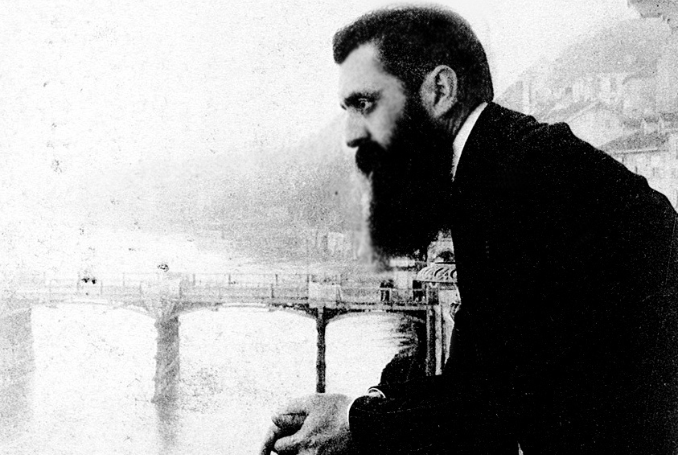
By Jamal Kanj
The phrase “fairytale” belongs to the founder of political Zionism, Theodore Herzl, when he used it to urge his fellow Zionists in 1897 to pursue their “dreams” in Palestine, stating “If you really want it, then it is no fairytale. “
It can be argued that much of what political Zionism professes about “Jewish” history and culture in Palestine is a “fairytale”?
The phrase “fairytale” belongs to the founder of political Zionism, Theodore Herzl, when he used it to urge his fellow Zionists in 1897 to pursue their “dreams” in Palestine, stating “If you really want it, then it is no fairytale. ”
Undeniably, Judaism has strong spiritual ties to the Holy Land, but that does not exculpate Herzl’s malicious “fairytale” dreams. Similarly, recognizing the Christian divine connection to the land of birth and the crucifixion of Christ does not excuse the crusades’ invasions. Likewise, the Islamic attachment to the land where the Prophet ascended to the heavens, does not make Palestine exclusively Muslim.
Throughout history, the land of Palestine experienced untold numbers of invaders, religious conversions, rise and fall of emperors and empires. To name but a few, not in any order: Akkadians, Egyptians, Hebrews, Assyrians, Babylonians, Persians, Greeks, Romans, Byzantines, Muslims, European Crusades, Ottomans, British etc. Withal, the indefatigable Palestinians have endured as steadfast witnesses to battles, carnages, victories, defeats, and retreats.
Within the context of national history, transient conquerors morphed like seasonal yellow leaves, while the original people of Palestine have remained the only historical constant deeply rooted next to their olive trees. Through it all, the indigenous Palestinians could have taken a new religion or converted to another, adopted new customs, or learned a new language, some of the invaders could’ve assumed local traditions or assimilated in their new home. Eventually, creating a unique collective national identity while staying true to their proven Philistines, Canaanites, and Jebusites genetic ancestors.
In 1948, a political movement predominantly comprised of descendants from East European Khazar Jewish converts claimed lineage to the ancient Hebrew Kingdom―which was one among more than a dozen historical invaders of Palestine. The European political Zionist movement sought an alliance with the British colonists to displace the original inhabitants, for the first time in their long history, by transplanting a racialist group of persecuted European refugees. The West absolved its sin against European Jews by inflicting the crime of uprooting the non-European Palestinians of their homes.
Historians hold differing opinions regarding the duration of the Hebrew Kingdom’s reign in the land of Canaan. However, there is some consensus that the United Hebrew Kingdom lasted approximately 80 years before splitting into two separate entities. Nevertheless, there is no disagreement that the original Hebrews were not indigenous to the land. In the book of Genesis 17:8 God addressed Abraham regarding the land of Canaan “where you now live a as a foreigner . . .”
Presumably, and according to the book of Genesis, God promised the “foreigner” the possession of the land of Canaan. While I prefer to steer away from discussing abstract or entertaining metaphysical powers, there is a convincing hypothesis told by Jewish, Christian, and Muslim religious authorities alike, that God’s promise was fulfilled in the united Hebrew Kingdom and ended by disobeying God when it split into two hostile “God’s chosen” people.
Until the late 19th century, when political Zionism emerged in response to Western Jewish hate, spiritual Zionists held to their beliefs that the “Jewish Kingdom” would be re-established by the Messiah. Christians and Muslims share with Judaism varying nuanced versions regarding the signs of the apocalypse.
Setting aside the theological aspects, there is no genetic relation between the original Hebrews who immigrated to Palestine from Mesopotamia, present-day Iraq roughly 4000 years ago, and the children of the East European Khazar converts. To allege lineage to a land basis religion, is similar to an Indonesian Muslim claiming a right to Saudi Arabia because it’s the birthplace of their religion. Nationality is determined not by a spiritual affinity to a place, but by people who possess a distinct cultural identity and have a continuous historical presence in a defined region.
Unfortunately, whenever “God” ostensibly communicates with Homo sapiens, it often leads to death and destruction. Examples such as Jim Jones and David Koresh come to mind in our lifetime. On a larger scale, many might remember when the 43rd US president, George W. Bush, told televangelist James Robison he had a “premonition” that led him to seek the presidency because God wanted him “to do it.” Whatever or whoever influenced Bush “to do it,” was neither omnipotent nor omniscient, as the false “premonition” resulted in the deaths of hundreds of thousands of innocent Iraqis and more than 4,000 Americans. Such is the continued suffering of Palestinians.
Lastly, even if today’s Jewish European converts were indeed the descendants of the ancient Hebrews from 3000 years ago, under accepted international law, they would have no admissible claim to an earlier unlawful occupation. Inasmuch as Arabs today have no right to inherit the past occupation of Spain, which lasted for 700 years, more than three times the overall Hebrew reign in Palestine.
In addition to the supernatural connection, political Zionism presents a seemingly benign assertion by arguing that there is only “one” Jewish state in the world, attempting to imply that it is comparable to other countries. This, however, is akin to defending apartheid South Africa because it was the only white nation in Africa, or advocating for only “one” Aryan state in Europe. Furthermore, there is no “one” Christian, Muslim, Hindu, Sikh, Baháʼí, Zoroastrianism, Rastafari, Yazidi, etc., state either. Even in countries with an absolute religious majority, affinity to a faith does not transcend the national identity of citizens, where nationhood is not a spiritual trait, but shared cultural values within demarcated national boundaries.
If anything, the 8th-century East European converts might have a stronger legal case, based on their proven genetics, to reclaim the Khazar Jewish empire that lasted for 500 years, significantly longer than the “fairytale” connection to the non-indigenous Hebrew Kingdom in the land of Canaan.
This is the second of a series of articles that will explore Zionist myths, artificial history, and made-up culture. For the first article, click here.

– Jamal Kanj is the author of “Children of Catastrophe,” Journey from a Palestinian Refugee Camp to America, and other books. He writes frequently on Arab world issues for various national and international commentaries. He contributed this article to The Palestine Chronicle







